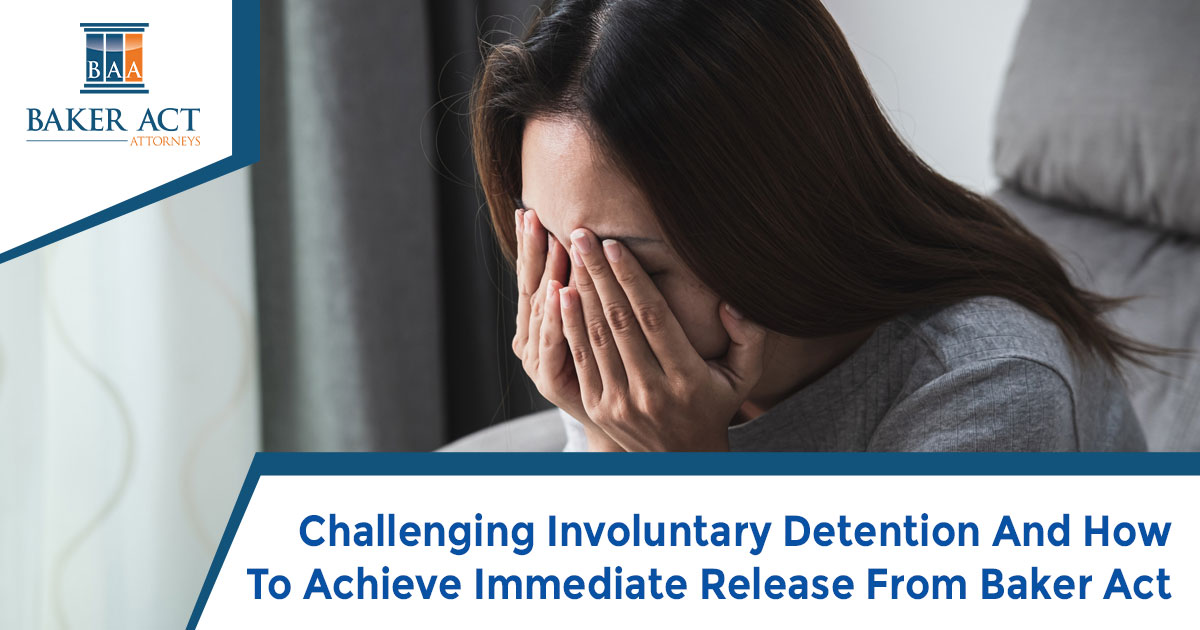Every year, thousands of Floridians are involuntarily detained under the Baker Act. While many of these interventions are life-saving, and can ensure that seriously mentally ill people receive the care they desperately need, this is not always the case. Sometimes, a person who does not meet the legal criteria for involuntary detention is unlawfully held by law enforcement, or a person who has been lawfully detained is then held for longer than the law allows by an unscrupulous receiving facility. Whatever the circumstances of your loved one’s involuntary detention, you’ll need an experienced attorney to help secure their immediate release from a Baker Act facility.

Overview Of Involuntary Detention Under The Baker Act
The Baker Act includes various provisions that regulate involuntary detention, examination, and treatment of people with significant mental health issues. When someone has been ‘Baker Acted’, this means that they have been detained and thereafter taken to a receiving facility.
The primary aim of involuntary detention and examination is to (i) stabilize a person who is a risk to themselves or others due to an untreated mental illness, and then (ii) examine them to determine whether they need further stabilization, whether through involuntary placement or through outpatient care. If your loved one has been stabilized, they should be immediately released from the Baker Act facility at which they are being held.
Criteria For Involuntary Detention
Involuntary detention and examination may be initiated in three ways: by a law enforcement official, by a psychiatrist or other similarly qualified professional, or by way of a court order, where a judge has found that the person meets the criteria for involuntary admission, and has requested law enforcement take them into custody.
A person meets the criteria for involuntary detention and examination if:
- They are mentally or emotionally impaired to such a degree that they cannot control their actions or perceive reality, leading them to struggle to meet the demands of everyday life;
- As a result of this impairment, they cannot determine whether they need psychiatric evaluation, or they have already refused such evaluation; and
- If they are not stabilized and given treatment, they are likely to suffer serious, harmful neglect, or there is a real risk that without treatment they are likely to seriously harm themselves or others.
It is crucial to note that a person can only be held in a receiving facility for up to 72 hours, initially (12 hours in the case of a minor). During this time, they must be evaluated by a psychiatrist or clinical psychologist. Thereafter, depending on the outcome of the assessment, they must either be discharged, give informed consent to remain on a Voluntary Admission basis, or the State must file a Petition for Placement. If a Petition for Placement is filed, the court may grant the petition, and the patient detained for up to an additional six (6) months. If your loved one hasn’t immediately been released you should reach out to a qualified Baker Act attorney as soon as possible.

When Is Involuntary Detention Under The Baker Act A Problem?
Though in many cases the Baker Act is a necessary mental health intervention, there are some circumstances in which it is used improperly. For example, the Baker Act should not be used when a person’s mental impairment is primarily due to substance abuse. In this case, Marchman Act proceedings may be more appropriate. Many wrongful Baker Act cases also involve people who accidentally consume too much medication, attend a hospital to receive treatment, and are then held for involuntary examination on the grounds that they are attempting to self-harm. Another common case involves children with behavioral issues being wrongfully detained after having an outburst at school.
Involuntary detention also becomes a problem when the 72-hour limit has passed, but the facility has taken no steps to either release them or petition to court for an involuntary placement order. In our experience, wrongful Baker Act detention is more likely in cases where a person has health insurance, and unscrupulous facilities are motivated to detain them for longer so that they can claim more money from the person’s insurers.

How Can You Secure Your Loved One’s Immediate Release From A Baker Act Facility?
If your loved one has been unlawfully Baker Acted, securing their immediate release is critical. The longer they remain in a facility, the more emotional distress they’ll endure. If the facility is not discharging your loved one after repeated requests to do so, you’ll need to contact an experienced Baker Act attorney to help you take further action.
Consulting with an attorney
Prior to consulting with an attorney, you’ll want to gather as much evidence as you can to demonstrate that the Baker Act was wrongfully applied to your loved one. Any medical records, communications from healthcare providers, or other relevant documents may be useful. You should also carefully document any discussions you have with law enforcement or healthcare providers concerning your loved one’s condition. These will help you to have a productive consultation with your attorney, ensuring that the next steps can be taken quickly.
Petitioning for a writ of habeas corpus
In cases where the treatment facility is now failing to release your loved one petitioning for a writ of habeas corpus may be the best appropriate course of action. In the petition, your attorney will either challenge the cause and validity of the detention or allege that your loved one’s rights are being violated or that they have been subject to an unfair procedure.
Your attorney will also present relevant evidence to the court, demonstrating that an unlawful process has been followed. With an experienced and skillful lawyer by your side, you should be able to get your loved one immediately released from the facility where they’re being detained. Once your loved one has been released, you can then ensure they get the care they need by helping them access a reputable outpatient treatment program.
Florida’s Leading Baker Act Attorneys Are Here To Help Secure Your Loved One’s Immediate Release
Having a loved one wrongfully Baker Acted is an incredibly stressful experience. You’re worrying about their well-being, trying to understand unfamiliar legal processes, and navigating conflict with the treatment facility all at once. Thankfully, you’re not alone. Mark G. Astor and his team have decades of experience in bringing legal proceedings to challenge Baker Act detentions. We are available to help you bring urgent legal proceedings to secure the immediate release of your loved one from an unscrupulous Baker Act facility. Give him a call today at 855-429-0074 – he’s always ready to fight for your loved one’s rights!

